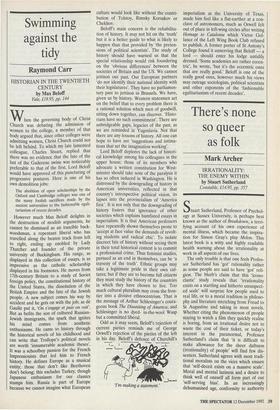Swimming against the tidy
Raymond Carr
HISTORIAN IN THE TWENTIETH CENTURY by Max Beloff Yale, f18.95, pp. 144 When the governing body of Christ Church was debating the admission of women to the college, a member of that body argued that, since other colleges were admitting women, Christ Church could not be left behind. To which my late lamented colleague, Charles Stuart, replied that there was no evidence that the fate of the last of the Gaderene swine was noticeably preferable to that of the first. Lord Beloff would have approved of this puncturing of progressive postures. Here is one of his own demolition jobs:
The abolition of open scholarships by the Oxford and Cambridge colleges was one of the many foolish sacrifices made by the ancient universities to the fashionable egali- tarianism of recent decades.
However much Max Beloff delights in the destruction of modish arguments, he cannot be dismissed as an irascible back- woodsman, a repentant liberal who has travelled along the beaten track from left to right, ending up enobled by Lady Thatcher and founder of the private university of Buckingham. His range, as displayed in this collection of essays, is as impressive as the catholic scholarship displayed in his footnotes. He moves from 17th-century Britain to a study of Soviet foreign policy, the constitutional history of the United States, the dissolution of the British Empire and the fate of the Jewish people. A new subject comes his way by accident and he gets on with the job; as de Gaulle put it, 'On s'engage et puis on voit'. But as befits the son of cultured Russian- Jewish immigrants, the spark that ignites his mind comes from aesthetic enthusiasms. He came to history through the historical novels of his childhood and can write that Trollope's political novels are worth 'innumerable academic theses'. It was a schoolboy passion for the French Impressionists that led him to French history. He defines Europe as a musical entity; those that don't like Beethoven don't belong; this excludes Turkey, though Japanese enthusiasm for our classics stumps him. Russia is part of Europe because we cannot imagine what European culture would look like without the contri- bution of Tolstoy, Rimsky Korsakov or Chekhov.
Beloff's main concern is the rehabilita- tion of history. It may not hit on the `truth' but it is a better guide to what is likely to happen than that provided by 'the preten- sions of political scientists'. The study of history should have warned us that the special relationship would risk foundering on the 'obvious differences' between the societies of Britain and the US. We cannot jettison our past. Our European partners `do not identify their national identity with their legislatures'. They have no parliamen- tary past to jettison in Brussels. We have, given us by history. Western statesmen act on the belief that to every problem there is a rational solution which men of goodwill, sitting down together, can discover. 'Histo- rians have no such commitment'. There are unbridgeable gaps, legacies of the past, as we are reminded in Yugoslavia. Not that there are any lessons of history. All one can hope to have are 'suggestions and intima- tions that set the imagination working'.
Lord Beloff deplores the lack of histori- cal knowledge among his colleagues in the upper house; those of its members who advocate a written constitution for West- minster should take note of the paralysis it has so often induced in Washington. He is distressed by the downgrading of history in American universities, reflected in that country's introspective political vision, its lapses into the provincialism of 'America first'. It is not only that the downgrading of history fosters that ignorance of other societies which explains hamfisted essays in imperialism. It is that American professors have repeatedly shown themselves prone to `accept at face value the demands of revolt- ing students and radical chic'. To isolate discreet bits of history without seeing them in their total historical context is to commit a professional crime. Thus feminist studies, pursued as an end in themselves, can be 'a travesty of the truth'. Ethnic groups may take a legitimate pride in their own cul- tures; but if they are to become full citizens they must study the history of the countries in which they have chosen to live. Too much cultural pluralism may cross the fron- tier into a divisive ethnocentrism. That is the message of Arthur Schlesinger's coura- geous book The Disuniting of America; and Schlesinger is no dyed- in-the-wool Wasp but a committed liberal.
Odd as it may seem, Beloff's rejection of current pieties reminds me of George Orwell's rejection of the pieties of the left in his day. Beloff's defence of Churchill's `I'm making a statement.' imperialism at the University of Texas, made him feel like a flat-earther at a con- clave of astronomers, much as Orwell felt out of place in left-wing circles after writing Homage to Catalonia which Victor Gol- lancz of the Left Wing Book Club refused to publish. A former porter of St Antony's College found it unnerving that Beloff — a lord — should enter his lodge untidily dressed. 'Some academics are rather eccen- tric', he wrote, 'but it's the eccentric ones that are really good.' Beloff is one of the really good ones, however much his views may outrage sociologists, political scientists and other exponents of the 'fashionable egalitarianism of recent decades'.


































































 Previous page
Previous page